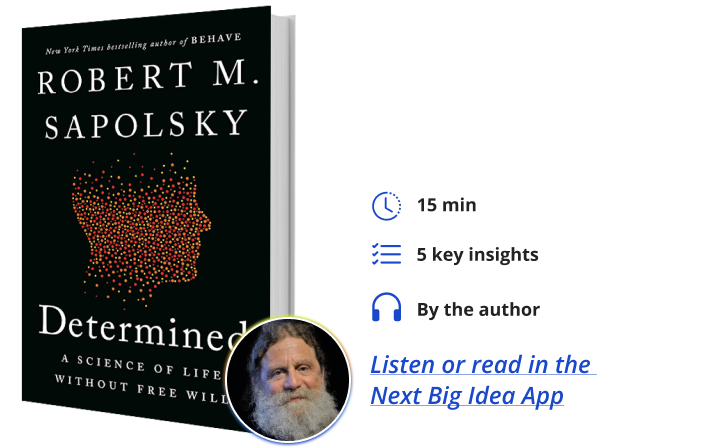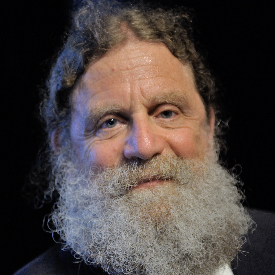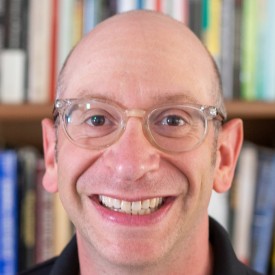Robert Sapolsky is an American neuroendocrinology researcher and author. His books include A Primate’s Memoir, The Trouble with Testosterone, Why Zebras Don’t Get Ulcers, and Behave, a New York Times bestseller, and named a best book of the year by The Washington Post and The Wall Street Journal. He is a professor of biology, neurology, and neurosurgery at Stanford University and the recipient of a MacArthur Foundation “Genius Grant.”
Below, Robert shares five key insights from his new book, Determined: A Science of Life without Free Will. Listen to the audio version—read by Robert himself—in the Next Big Idea App.

1. Who we are now is solely the outcome of everything that came before us.
When we observe another’s behavior, we might question why they did that behavior, but what we’re really asking is, “What part of the brain just did that, and what part stopped doing that?” This is where behavior comes from, however; by wondering why that behavior occurred, you’re also asking, “What things, in the last couple of seconds, triggered those parts of the brain?” This is known as sensory stimulus. For example, if you put people in a room with a really disgusting foul garbage smell, they will become more socially conservative on questionnaires, without having a clue what caused that change.
If you go back in time further, to the hours before, or the days before, behavior can be influenced by your hormones. What were your hormone levels like this morning? For instance, if you had elevated levels of a hormone called oxytocin this morning, and you found yourself playing a game with a friend this afternoon, you might find yourself more likely to be generous and forgiving towards them because of the elevated hormones from a few hours ago.
What about how you’ve been over the last few months: have you suffered a trauma? Did something wonderful happen to you? Those experiences will have changed your brain due to neuroplasticity. For example, if you have gone through a trauma, and you now have post-traumatic stress disorder, it’s likely that a part of your brain called the amygdala, which controls fear and anxiety, will have grown in size. As a result, you will see things as threatening that other people perhaps don’t; through neuroplasticity, the actual structure of your brain has been changed over the course of those few months.
Your current behavior could also be influenced by something even further back, back to adolescence. There’s a part of the brain called the prefrontal cortex that makes you self-disciplined and control impulses. By late adolescence, you’re finally finishing the first round of construction on your prefrontal cortex. In other words, the world that randomness has handed you in terms of environment as an adolescent is going to be shaping the frontal cortex you’re going to have as an adult decades later.
Even further back, into childhood, there are formal checklists of how many adverse childhood experiences a child could be exposed to. Were you abused? Was there a substance abuser in the family? And so on. You can also come up with a checklist of how many ridiculously lucky childhood experiences a child could have. Your experience as a child, or whichever checklist you tick the most boxes of, can be shockingly predictive of what your adult behaviors will be. For example, how likely are you to get into trouble with antisocial violence by the time you’re an adult? With each individual step of yet another adverse childhood experience, there’s a statistically reliable increased likelihood that that’s the sort of adult you’re going to be.
“What your ancestors were doing centuries ago will influence how you act now.”
Continuing to go further back, we reach your genes. Genes interact with your environment, an environment you can’t control. For example, if you have one type of gene and you experience a lot of stress in childhood, you are at greater risk of having problems with depression as an adult. However, if you have that same gene variant but it’s not combined with early stressors, it won’t have any effect on you as an adult. Equally, if you don’t have that gene variant but you do have early stressors, it also won’t have any effect on you as an adult. Two things you had no control over can have a very powerful effect on all sorts of aspects of adult behavior.
With one last leap back, we can look at the sort of cultures your ancestors invented centuries ago. These different ecosystems can influence whether you believe in one God or many gods. This can influence whether when somebody strikes you, you turn the other cheek, or you take revenge. You could have been brought up in a collectivist culture, like the rice-growing regions of Southeast Asia, or an individualistic culture like the United States. What your ancestors were doing centuries ago will influence how you act now. For example, how many seconds did you have to cry as an infant until your mother was likely to respond? Mothers from collectivist cultures pick up their babies sooner than those from individualistic cultures. From the first minutes of your life, how you are constructing your brain is being shaped by what your forebears were valuing for centuries before.
So, all these different factors from one second before to thousands of years before matter; they all create one single influence. For example, if you are talking about genes, you can talk about their evolution millions of years ago, and you can talk about which proteins you made in your brain this morning. There is one continuous arc of influence, and there isn’t a crack in there to shoehorn in a notion of free will.
2. Tenacity, self-discipline, and stick-to-it-iveness are made of biology.
People have trouble believing that tenacity, self-discipline, and stick-to-it-iveness are made of biology; however, most people are willing to admit that there’s stuff we have no control over. These days, if you’re not taller than 7’ 8” or something, you’re probably not going to play in the NBA. If you don’t have a certain gene-environment profile, you’re probably not going to have perfect pitch. When you grow up, if you’ve not got the right makeup of subtypes of receptors for a particular neurotransmitter, you’re not going to be an ace at Jeopardy. So there is stuff we do and truly have no control over, no free will over our natural attributes.
Where free will plays its part is in what you do with those attributes. Are you 5’3” Muggsy Bogues who played in the NBA? Are you Edison who went through a thousand failed experiments before he got a light bulb to work? Or did you squander your natural gift? Seventy percent of wealthy families have lost their wealth by the second generation. The natural things that were handed to us we had no control over, but what we do with it, that’s the measure of us, and that has nothing to do with biology—or does it?
“If you’ve been stressed in recent months, your frontal cortex will have atrophied to some extent.”
One could argue that it has everything to do with biology because it has everything to do with what sort of prefrontal cortex did a minute ago, a year ago, and a century ago wind up producing in you. If you have elevated levels of testosterone this morning, whether you were female or male, your frontal cortex is going to have more trouble getting the impulsive over-the-top parts of your brain to think twice before they do something idiotic. If you’ve been stressed in recent months, your frontal cortex will have atrophied to some extent. If as a fetus, you grew in the womb of a woman who is poor and stressed, you’re going to be born with a prefrontal cortex that’s on average a little bit less developed. You could argue that it’s all natural attributes, that you have no free will, or you could argue that it’s what you do with your attributes.
3. Despite what everybody might predict, we’re not going to stop believing in free will.
There are interesting experiments where you prime someone psychologically to believe less in free will and they’re more likely to cheat in the game right after that. But you can also look at people who have thought long and hard about these issues; what are the sources of human goodness and human evil? Are we captains of our ships? Studies show you’re going to be equally ethical, regardless of how long and hard you consider those existential questions.
Dropping the belief that you can and should be held responsible for your actions because there’s no free will may make people run amuck for a few minutes afterward, but the people who have really thought about it are no less ethical than people with other views.
4. How will we protect ourselves from dangerous people?
We can protect society from dangerous people without having to invoke concepts of blame and responsibility. If a car’s brakes aren’t working and the car is dangerous, you put it in the garage, but you don’t preach to it about how it has a rotten soul. If your kid has a runny nose, you keep them home from preschool, but you don’t tell them they can’t play with their toys today because they did something wrong. We have learned how to subtract out moral responsibility from all sorts of realms, and we still know how to keep the world safe from cars whose brakes are cut.
“The notion of a meritocracy is just as suspect as the notion of a criminal justice system.”
The flip side applies as well. It makes so little sense to have a world that includes blame and punishment, just as it makes as little sense to have a world built around praise and reward. We don’t earn either. The notion of a meritocracy is just as suspect as the notion of a criminal justice system.
We can keep society safe from dangerous people and we can make sure it’s the competent people who wind up being the judges and the neurosurgeons, and we can do all of those without convincing people that they deserve more or less consideration than someone else.
5. We’re still learning.
I readily admit that 99 percent of the time I’m a total hypocrite and I can’t function as if we have no free will. Nonetheless, there are grounds for optimism. We have proven over and over again over the years that we can subtract a sense of moral responsibility or moral goodness out of the realms of people’s behavior. The roof hasn’t fallen in and in fact, the world has become a more humane place.
We figured out centuries ago that people with epileptic seizures are not friends of Satan and that we don’t have to burn them at the stake. We figured out about 50 years ago that schizophrenia is not caused by mothers with unconscious, toxic hatred of their children. We figured out in recent decades that some kids who have trouble learning to read have weird cortical malformations in their brains, so they reverse loop letters and they have dyslexia. We are learning about the biology of how some people, no matter how intent and committed they are, wind up being obese. We have learned the biology of why some people love people of the same sex and some of the other. We’re learning all these realms where we are subtracting out conventional senses of culpability, responsibility, punishment, praise, reward, all of that. All that has happened is it has become a more humane planet.
If you really think about it, none of us deserve or have earned any more consideration of our needs than any other human. If you really think about it, hating someone makes as little sense as hating an earthquake, and these are the only logical conclusions. Even with your best efforts, you can think that way only one percent of the time, but how about you try for two percent of the time instead?
To listen to the audio version read by author Robert Sapolsky, download the Next Big Idea App today:































